If you’ve been trying to cook healthier meals, chances are you’ve thought about the type of oil you’re using. There seems to be so much controversy over which oil is best and when.
During your research, you’ve probably heard of avocado and canola oil. How healthy are these oils? Can you use them for things besides cooking? Which one is better?
In this article, I’ll compare these two super popular oils and answer all the questions above. Let’s get started!
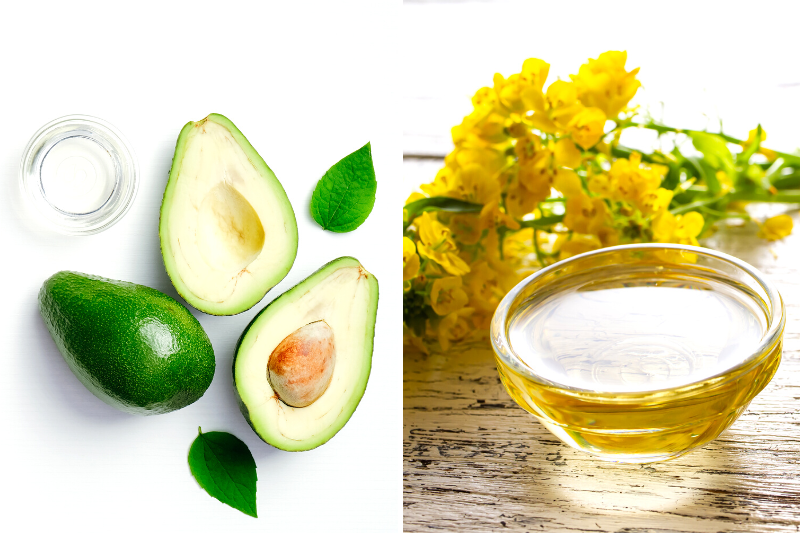
What Is Avocado Oil?
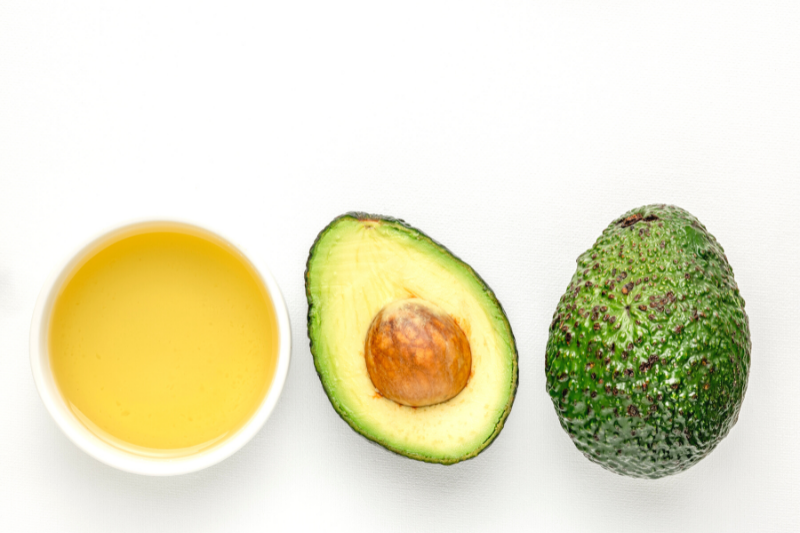
Avocado oil is a vegetable oil. It comes from the Avocado tree that grows in Mexico.
Unlike most vegetable oils, avocado oil does not come from the seed of the fruit. Instead, the fruit itself is cold pressed to extract the oil. This is because the fruit consists of about 63% fat, making it the perfect product to create an oil.
You probably already know that people cook with avocado oil. It’s a flavorful oil that comes with a lot of health benefits. But, did you know that people also use avocado oil for their hair, under eyes, and nails?
Benefits Of Avocado Oil
Avocado oil is a very popular product because it’s rich in health benefits. We’ll go over these benefits more in-depth later. But, here are some of the main benefits that avocado oil provides:
- Contains antioxidants
- Contains healthy fatty acids
- Is moisturizing for skin & hair
- Protects the skin
- Anti-aging
- Reduces cholesterol & boosts heart health
- Reduces inflammation & arthritis symptoms
- Promotes quicker wound healing
What Is Canola Oil?

Canola oil is also a healthy vegetable oil. This oil comes from the Canola plant, Brassica napus. The plant comes from Canada and is one of the most important oilseed crops around the world. The name is a combination of “Canada” and “ola” which means “oil”.
Unlike avocado oil, canola oil is not completely natural. The plant was created by Canadian scientists. They did this by crossbreeding a type of rapeseed plant that is edible.
Usually, the plant contains toxic compounds called “glucosinolates” and “erucic acid”. But, because they crossbred the plant, they were able to breed out these toxic elements.
As a cross-bred plant, the canola plant looks just like the rapeseed plant. The difference is that the canola plant is safe to eat and contains different nutrients.
The canola plant is not a natural plant, so some people are apprehensive about trying it. About 95% of the plants are “genetically modified”. This seems to be a bad word for those seeking healthier options.
But, scientists continue to make new varieties that have improved seed quality. The goal is to produce healthier and stronger plants fit for consumption. Because the plant is genetically modified, the oil’s quality has increased.
Benefits Of Canola Oil
The benefits of canola oil are like that of avocado oil. We’ll go more in-depth into these benefits later, but here are the main benefits that canola oil provides:
- Contains antioxidants
- Contains healthy fatty acids
- Is moisturizing for skin & hair
- Protects the skin
- Anti-aging
- Promotes quicker wound healing
Avocado Oil Vs Canola Oil
Now that you know how each oil is created, you’ll be curious to know how they compare. Is there enough of a difference to set either oil apart? Which oil should you go with: avocado or canola?
Similarities Between Avocado And Canola Oil
They Contain Fatty Acids
Fatty acids are important to the body because they support the immune system. They build and strengthen cells. They regulate the nervous system and support brain and vision function. They also help the body absorb other nutrients.
Avocado oil and canola oil are similar in that they’re both rich in fatty acids. Both oils are rich in Omega-3 and Omega-6 fatty acids.
They Heal & Moisturize The Skin
Both oils are rich in the antioxidant vitamin E. Vitamin E protects the skin from free radicals and promotes the healing of skin cells. Both oils speed up the healing time of injuries. They moisturize and soften the skin and reduce the appearance of blemishes. They even reduce the signs of aging.
They Heal & Moisturize Hair
Likewise, both oils are wonderful for use on the hair. Just as they moisturize the skin, they also moisturize the hair. Over time, hair will become stronger, healthier, and shinier.
What Are The Differences Between Canola Oil And Avocado Oil?
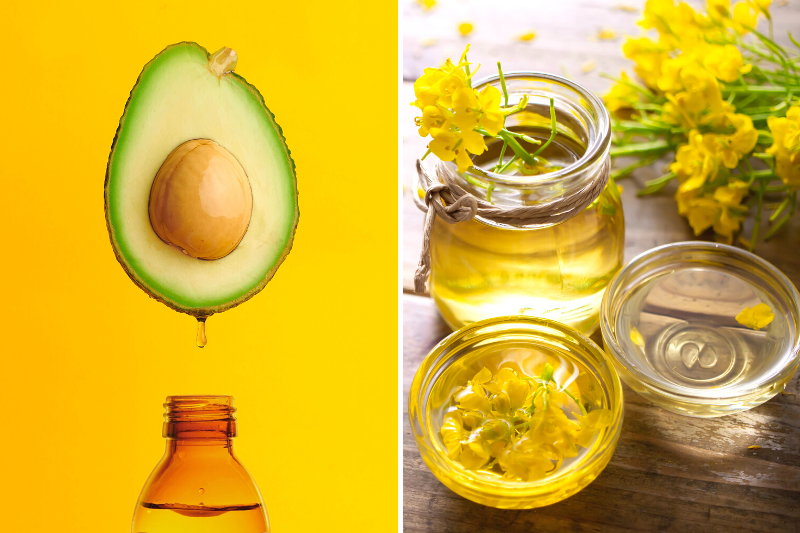
The Oils Are Processed Differently
Avocado oil goes through gentle processing called “cold pressing”. We press the fruit of the avocado to extract the oil. Because this process is gentle, the oil retains all the nutrients that make avocado oil so good for the body.
Avocado oil may go through further refining. The oil goes through a straining process to remove the pulp and any other impurities. This process is less natural and removes many of the nutrients from the oil. But, you can choose to buy the more effective unrefined oil over the refined oil.
The extraction process of canola oil is more intensive. First, the seeds go through heating drums where they are cooked. The resulting flakes go through expellers for pressing. Pressing is the process that removes most of the oil.
Like avocado oil, canola oil may go through further refining to remove impurities. Also like avocado oil, further refining removes many of the beneficial nutrients.
Unlike avocado oil, it’s very difficult to find unrefined canola oil.
Nutrition Facts
Although both oils are similar in nutrition, they do have their differences. It’s up to you to determine which is better for you.
| Nutritional Information (Per Tablespoon/14g) | Nutritional Information (Per Tablespoon/14g) |
| Canola Oil | Avocado Oil |
| Calories: 124 | Calories: 124 |
| Vitamin E: 16% RDI | Vitamin E: 23% RDI |
| Vitamin K: 8% RDI | Vitamin K: 0% RDI |
| Total Fat: 14 grams Saturated: 1.03g Monounsaturated: 8.86g Polyunsaturated: 3.94g | Total Fat: 14 grams Saturated: 1.6g Monounsaturated: 9.88g Polyunsaturated: 1.89g |
Vitamin E
Avocado oil has a significantly higher amount of vitamin E. Vitamin E is an antioxidant essential for protecting your cells from free radicals.
Vitamin K
But, canola oil contains vitamin K, while avocado oil does not. Vitamin K is good for blood clotting and building bones. This may or may not be important to you depending on your health.
Fatty Acids & Polyunsaturated Fats
Omega-6 fatty acids are polyunsaturated fats. Too many Omega-6s can cause inflammation. Today, most people eat a diet full of refined foods high in Omega-6 fatty acids.
In an ideal situation, we would consume Omega-6s and Omega-3s in a 1:1 ratio. In reality, most people consume a much higher content of Omega-6s than Omega-3s. So, when you have the chance, you should choose an oil lower in polyunsaturated fats.
Monounsaturated Fats
In contrast, monounsaturated fats are healthy fats. They are linked with cardiovascular benefits and anti-inflammatory properties. Avocado oil has a slightly higher monounsaturated fat content than canola oil.
Saturated Fats
Saturated fats drive up cholesterol, possibly causing a blockage in the arteries. Both avocado oil and canola oil contain low amounts of saturated fat. But, canola oil contains less.
Trans Fats
One of the key things to notice here is that canola oil contains trans fat. The amount of trans fat is so low that it is not usually listed on nutrition labels. Still, research has shown that it contains enough that it can be detrimental to your health.
Inflammation
Avocado oil reduces inflammation in the joints and in the skin. Most sources say that canola oil also reduces inflammation. It may even be helpful for arthritis.
But, there are some studies that suggest canola oil actually causes inflammation. More research is needed to understand this better.
Heart Health
Likewise, avocado oil supports heart health. It contains the antioxidants “polyphenols” and “carotenoids”. These help you gain a healthier heart.
Canola oil is marketed as “heart-healthy”, but some researchers say otherwise. A 2018 study saw a link between canola oil consumption and metabolic syndrome. Still, researchers say they need to better study the effects of canola oil on the heart before drawing any conclusions.
Avocado Oil Vs Canola Oil For Frying
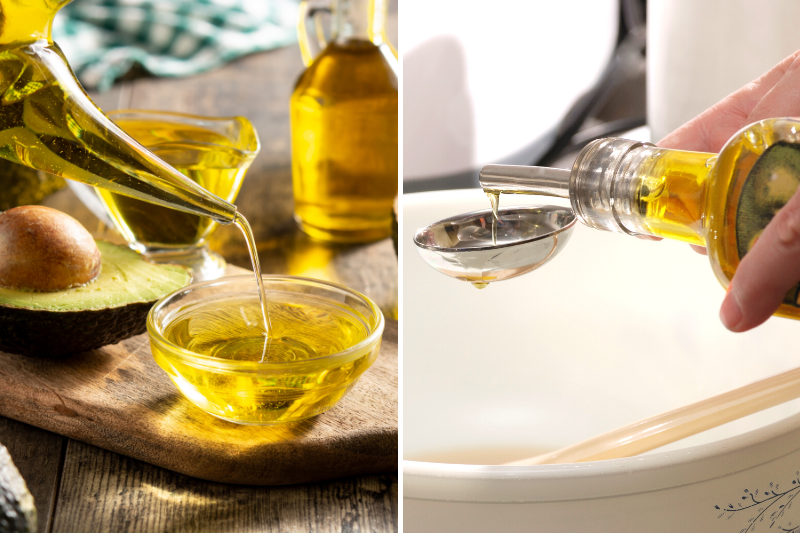
When it comes to frying, you’ll want to go with avocado oil. It has a higher smoking point at 520℉ (271°C). Canola oil only has a smoking point of 400℉ (204°C).
Canola Oil Vs Avocado Oil For Health
When it comes to skin and hair health, both oils are equally great. Both oils are moisturizing, protecting, and healing. We haven’t noticed any significant differences between the oils when it comes to topical use.
When it comes to consumption, avocado oil seems to be the better option. Avocado oil comes from a naturally-grown plant, unlike canola oil which is man-made. Plus, avocado oil has more vitamin E and monounsaturated fats. It’s also lower in monounsaturated fats.
Canola Vs Avocado Oil For Weight Loss
If you’re trying to lose weight, you should be careful with both these oils. They are fats, after all, and they can both cause you to gain weight if you consume too much. Both oils contain the same amount of calories and fat. So, neither is really better for weight loss than the other.
Can I Substitute Avocado Oil For Canola Oil?
Yes, you can substitute avocado oil for canola oil. In fact, I’d recommend that you do so since avocado oil is slightly healthier than canola oil. Avocado oil has a higher smoking point, and it has more health benefits than canola oil.
You can also substitute avocado oil for canola oil for your skin or hair care routine. Both oils have very similar skin and hair benefits.
Conclusion
Whether you choose avocado or canola oil really depends on how you’re going to use the oil. Both oils are very similar when it comes to using them on the skin and hair. You’re not likely to make much of a difference as they’re both very healing and moisturizing.
But, if you’re using the oil to cook, you’ll want to go with avocado oil. First, avocado oil is safer to cook with. This is because its smoking point is significantly higher than that of canola oil.
Second, avocado oil seems to be the healthier choice. It contains less polyunsaturated fat and more monounsaturated fat. It contains more vitamin E, no trans fat, and reduces inflammation. Plus, avocado oil is a natural product not surrounded by controversy like canola oil.
When it comes down to it, you should choose whichever oil is best for you. Canola oil is not inherently bad as some sources would lead you to believe. But, avocado oil does seem to be the healthier option.
Learn how avocado oil is compared to olive oil and coconut oil, exactly how to store avocado oil here or how long it lasts here as well as how canola oil is compared to peanut oil here. Also find more guides to using avocados for your DIY beauty recipes here.

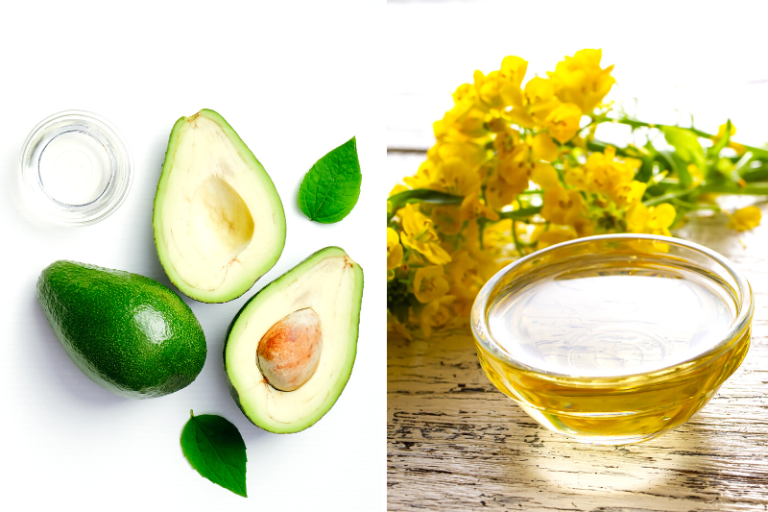
Comments are closed.